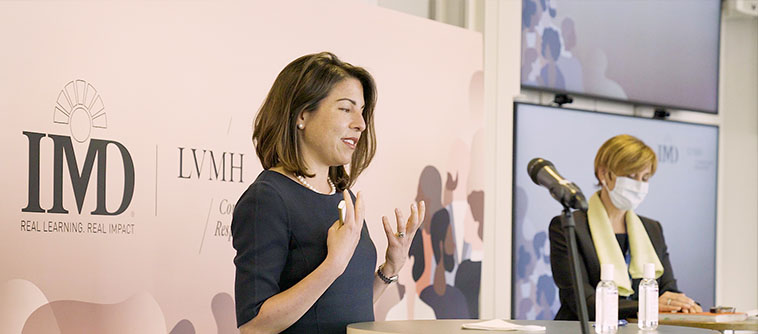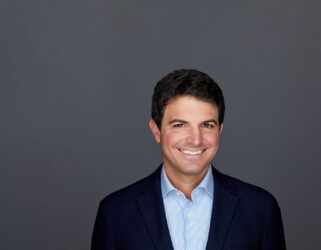The psychological complex of imposter syndrome is domain-specific and is more a product of the environment, rather than the individual, said Jennifer Jordan, a social psychologist and IMD Professor of Leadership and Organizational Behavior, at an event with Louis Vuitton Moët Hennessy (LVMH).
Disproportionately affecting women and minorities, it fosters insecurity and self-doubt in those who believe they secured important roles not because of their competencies or qualifications but by some oversight.
“When we feel like an imposter we aren’t at our most creative or innovative, and it increases anxiety,” said Jordan, speaking to assembled group of more than 100 LVMH CEOs, senior executives and employees who had gathered to discuss Equity, Inclusion & Diversity (EI&D). “By shifting certain variables in an environment, we can reduce feelings of imposter syndrome and induce positive behaviors.”
Jordan provided best practices for contextualizing and minimizing the impact of imposter syndrome, including prioritizing inclusion, flattening hierarchies, using less stereotypic language and equal representation across divisions. She also suggested companies promote a growth rather than fixed mindset.
“The idea that you are who you are – the fixed mindset – is not conducive to inclusion,” said Jordan. “Have your organization embrace the fact that practice, effort and experience are the foundation of talent and effectiveness, and your organization will have a head start to becoming truly diverse and inclusive.”
Accelerating the EI&D journey
While emphasis on EI&D has grown over the past few years, the pandemic spurred change at an unprecedented speed, said Josefine van Zanten, IMD’s Senior Advisor on Equity, Inclusion & Diversity. For many organizations, operating in a more equitable manner is no longer a choice, but an imperative.
“Humans are social animals – and this is a good thing because it allows us to care for our mates,” observed IMD President and Nestlé-Chaired Professor Jean-François Manzoni. “But all too often, these mates are defined by whether they look like us – or think, act, love or worship like we do.”
Moreover, van Zanten reminded the group, fostering diversity is more complicated than it looks; it is composed of both visible and invisible components that factor into our day-to-day judgements and behaviors: “Our unconscious biases kick in on the visible aspects immediately, without us being aware of it.”
As gender and nationality are the only two diversity aspects that can currently be measured globally, they often receive the lion’s share of organizational diversity targets. According to van Zanten, inclusion – the feeling of belonging – can also, and should also, be measured by whether employees feel safe to speak up, if they believe they work in a respectful environment and a workplace that is free from both physical and psychological harassment.
“People from the ‘ingroup’ are often unaware that they are included, but people from underrepresented groups are painfully aware they are not,” said van Zanten. “It is the link between diversity and inclusion that has the power to bring out the very best that an organization has to offer.”
In fact, a well-managed workplace environment, workplace culture and diversity strategy are also the answer to better overall performance.
“If an employee is better included, they will feel more engaged,” stated van Zanten, “and that engagement will lead to higher productivity.”
Even leaders must reflect
Participants in today’s event spoke about the type of inclusive environment they are inspired to work in, as well as what type of inclusive Leadership skills they would like to see more of. LVMH’s Global Head of Diversity & Inclusion, Hayden Majajas, revealed what LVMH had already achieved in the EI&D space, as well as the plan to move forward even further on the subject. He was joined by Chantal Gaemperle, Group Executive Vice President, Human Resources and Synergies, and member of the LVMH Executive Committee, who shared an inspiring message for all participants.
The family-run group that is home to 75 distinguished “Maisons” rooted in six different sectors says a diverse and inclusive workplace is the “defining” aspect of its business.
From its Inclusion Index to its worldwide initiatives (more than 100 in 2020 alone) tackling topics such as discrimination based on gender, ethnicity and sexual orientation, the group’s brands develop their EI&D strategies based on their unique needs but share access to governance and support structures; some are currently focused on advanced procedures like equity audits, pay audits or access to benefits, while others are in the planning or opening up conversations stages.
“Part of minding the gap is challenging the work that we do,” said Majajas. “It’s not about hard and fast rules and goals for every dimension, but ensuring we have a workplace that attracts a diverse and inclusive staff.”
Majajas stressed “Inclusion is innovation”, and that in this difficult time with stores unable to open and people in lockdown, good leadership requires flexibility.
“Our people expect inclusive leaders,” said Majajas. “Each and every one of us is a leader in some way – and we need to question how we can bring the values that define who we are and how we operate to life?”




